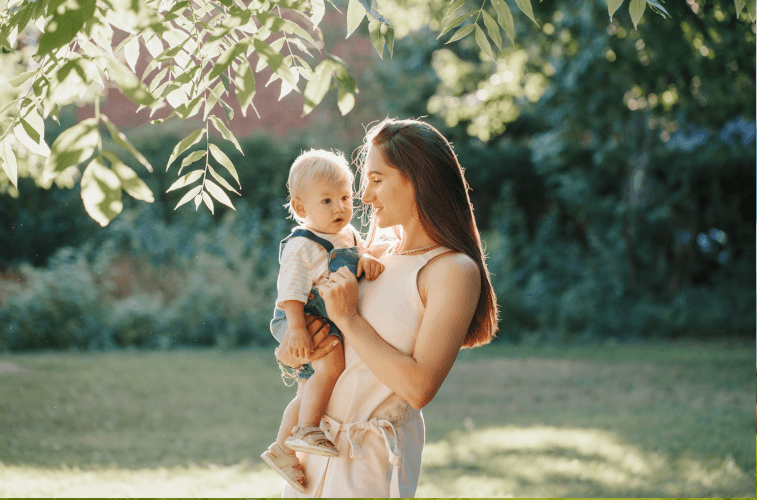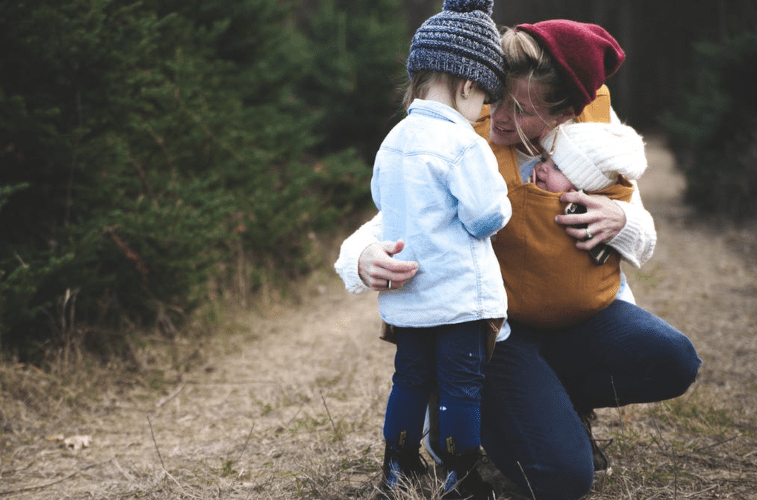When will my baby learn independent sleep? That’s the question I asked for 4 years.
“Sleeping through the night, every night, without needing a parent’s assistance is like learning to walk or talk or drink from a cup—all kids get there, but they do so at their own speed, a little at a time, and in their own unique way.”
Elizabeth Pantley
The day my first child was born was the day we were unwittingly thrown into the world of sleep troubles.
Despite having decided to both bedshare and breast feed on demand at night, nights were insanely hard, and the days weren’t much easier. The comments came from all directions.
“She really resists sleep, doesn’t she?” Said my midwife, at our one-week checkup.
“I’ve never seen a baby so young be so awake after nursing!” Said the lady at church.
I tried everything. We rocked, we baby-wore, we sang, we read sleep-books, we tried a swing my friends graciously donated to us to no avail…
I learned about the different sleep-stages and learned to identify when she was in her first or second sleep cycles, I watched her eyes jump around and her breathing change as she entered REM.
We even tried the holding-a-basket-atop-the-vibrating-dryer method (not advisable).
Due to all the breastfeeding literature I had read while pregnant, I already knew that infant sleep wasn’t quite the smooth all-night-long hibernation our modern culture would have us believe. I wasn’t even expecting that.
I just wondered why when even when I happily provided her with biologically appropriate sleep-assistance (meaning I wore her, or nursed her, or held her on my chest at night) sleep was still so hard for her to fall into.
No matter what we did, it seemed like it was phase after phase of yet another sleep woe.
I was grumpy and exhausted, not yet used to getting less sleep as a mother (it got easier over time to adapt). I cried a lot more than I had used to, probably because its incredibly hard to be rational when you’re sleep deprived!
There were days when the only way for me to get 8 hours was to stay in bed with her for 12 or 13.
During one particularly stressful night I remember my husband sweetly saying to me,
“Rachel, you can do anything for one year.” I hoped he was right. She was obviously a high sleep-needs baby, and she would probably grow out of it in time.
Well, you might guess that the year came and went. It never really improved all that much. Naps improved due to her naturally needing less naps, but night times were always up in the air.
There was one hard period of 12 weeks (yes, I recorded it’s duration to make sure I wasn’t just imagining things!) when she randomly developed a bi-phasic sleep schedule and each night at around midnight she would wake for 1-3 hours to play and read.
The only way to get her back to sleep was to wake up and wait until she was tired again. 12 weeks.
(Note: I have since done a bit of learning about bi-phasic sleep. Some think it may be just another variation of regular human sleep patterns. Not one I particularly prefer…but okay. One day she just gave it up and went back to normal…)
Years later I am still attempting to provide my kids with what I believe is both practical as well as biologically appropriate in terms of infant child sleep–especially regarding independent sleep. I had to night wean her at about 20 months due to pregnancy, but we made it through.
Only recently was my now 3.75 year old toddler willing to learn how to move on from bedsharing and try out her own room. So much for “you can do anything for one year.” It had almost been four!
So what is biologically normal as far as toddler sleep goes?
Do most kids ‘grow out of it’ sooner than mine did, is my daughter just some sleep enigma?
In her book “The No-Cry Sleep Solution For Toddlers and Preschoolers” Elizabeth Pantley summarizes the findings of a very eye-opening study published by the National Sleep Foundation.
After interviewing almost 1500 adults who lived with young children at home, they discovered the following:
Among toddlers, 38 Percent woke up once per night, 5 percent woke up twice per night, and 4 percent woke up three or more times per night, requiring an adult’s help to fall back to sleep. (We fell into that last category.)
Among Preschoolers, 31 percent woke once per night, 3 percent woke twice per night, and 2 percent woke three or more times per night.
For some reason, reading this information was extremely enlightening and comforting to me.
According to these results, a whopping one-third to one-half of all toddlers and preschoolers experience night waking episodes at least once a night.
You certainly can’t call night waking in 1/3 to 1/2 of these young children a rare or uncommon occurrence! In fact, I would even be inclined to call their night waking pretty darn normal. It is normal for kids to take their own time before independent sleep is achieved.
A revelation! My daughter was not an enigma!
Elizabeth concluded the same on page 143:
“What all this means is that it is perfectly natural, absolutely normal, and totally expected for your toddler or preschooler to wake up in the night and need your help to fall back asleep.”
The No Cry Sleep Solution For Toddlers And Preschoolers, Page 143

A sigh of relief. A thousand sighs. I had a normal child, and I was not the cause of her sleep woes.
By nearly 4, I could tell that my daughter was slowly and steadily improving. It eventually only took a hush or a hand on her back to lull her back down. She still had vivid dreams, but she no longer required a snack to comfort her at 3 in the morning.
And now that she was newly learning to sleep in her own bed, she was waking only once each night. And although was still not my ideal situation while pregnant and tired, was better than what we had always been used to.
Transitioning to Independent sleep.
The week or two following my daughter’s move to her own room, she woke once or twice a night and needed one of us to sit with her for 5-10 minutes while she fell back asleep. This was manageable but obviously not fun.
Walking across the house each night made me question why we had stopped bedsharing or room sharing in the first place, but I hoped that this move would be the nudge she needed towards longer and deeper sleep.
Each morning I would hug her and express to her how proud I was that she had done something so brave. Sleeping alone is hard, and although she won’t have to do it for long (the next toddler will move in with her in a few short months), it is nevertheless dark, and lonely, and scary for a young child. (To be honest, it was scary for us, too! To have her so far away!) I wanted to make her feel excited and proud of herself too.
We started being able to sit with her for shorter and shorter lengths at each waking. Sometimes, we were even able to leave the room while she was still awake, and she learned that falling asleep on her own was something she was capable of.
I helped her brainstorm ideas she could try to help herself fall back asleep, and we would repeat the list every night to remind her.
- Say a prayer.
- Hug your stuffed animal.
- Sing a song.
- Think about something that makes you happy.
Each night I would lay in my own bed listening for and hearing every single sound in the world so that I could jump up and help her. I didn’t want her to cry.
The crackling wood in the fire. The buzzing electrical receptical behind my bed. By husbands snoring.
Was that a dog or my daughter? Is she sleep talking again? Why does the house creak so much?
When she finally called out one Friday night, I went to her room to console her, and she was quite upset. I tried to talk to her, but she was having trouble relaxing.
Slightly exasperated, I explained to her that I really needed to go to bed. migraines had been coming almost daily since becoming pregnant, and sleep would help me feel better.
I explained to her that I needed my sleep, just like she needed hers. Especially I needed it now that I was growing a baby.
I also added that I love to help her, but that I wanted her to learn to sleep by herself. Because I knew she could do it.
The rest of that night went on as normal, but the next day, it happened.
She slept all night without needing me.
The next morning she insisted that she had cried for me, but I never heard her on the baby-monitor. And I would have heard her. She was quietly pleased with herself. I was overjoyed for her and let her know it!
I think that our midnight conversation had helped her understand why she even needed or wanted to learn how to sleep. She was finally old enough to think about it, and truly choose to self sooth.
Dr. Bill Sears shares a similar sentiment:
Your three-year-old needs to understand the importance of not disturbing your sleep…Above all, don’t feel you are spoiling her or that there is something psychologically wrong because you are having trouble getting your child to sleep in their own bed. When it comes down to it, the time your youngster spends in your room (or in your bed) is relatively short, but it encourages a positive life-long attitude about bedtime, conveying that sleep is a pleasant – rather than fearful – state to enter.
Getting Your Child To Sleep In Their Own Bed
I’m happy to report that the next night it happened again. And then again! To be honest, I couldn’t believe it at first!
Upon asking her about it in the morning of the third consecutive day, she reassured me that she knew how to sleep in her own room now. I guess she did.
Huh.
Now what?
The funny part is, I woke up for an hour last night, from muscle memory, with nothing to do. It took me a while to fall back asleep.

So when do kids naturally learn how to sleep through the night?
A friend of mine recently admitted to me that her own nearly-5 year old daughter still stood at the top of the stairs crying on some nights, requiring sleeping in moms room to calm down again. I also recall my own little brother still frequently having night terrors at age 10 or 11.
It’s more common than we are lead to believe.
Kids are not robots. They can’t be controlled. They are persons, with their own needs and their own developmental time tables.
Sleep independence comes in it’s own due time. It may be long, but it will come.

Dr. James Mckenna, in his plain and good way, says this: (formatting mine)
Some people confuse an infant’s willingness to sooth itself back to sleep as a sign of “independence”, autonomy and/or a life long sense of confidence.
But life long self sufficiency and/or confidence (and, trust, for that matter) has absolutely nothing to do with the age at which an infant puts its self back to sleep without its parent or loved one, i.e. to “self soothe”.
All children eventually learn how to put themselves back to sleep.
What is really being pushed on parents here is the arbitrary social idea and/or judgment that the earlier the infant does not need intervention the better (in some way for the infant and eventual child and adult) and this concept is inappropriately used as a weapon often by false claims suggesting that if an infant or child cannot by some pre-determined age “self-soothe” it never will, or that something is either wrong with them, and is in need of repair, or that their parents are deficient (for not setting “boundaries)
this is silly and offensive.
Dr James Mckenna, FAQ #4.
The good news to come from all of these years of sleep battles is that it is no longer a battle for me.
I have learned to accept it, and adapt to it. I’ve learned to tell myself “you will sleep again”. I’ve learned that it isn’t my fault, it isn’t the child’s fault, and that I can have peace.
(That doesn’t mean I am always positively chipper when my sleep is interrupted. But I am no longer nervous about what it means. The kids aren’t broken.) Plus, I’ve learned a lot of tips and methods over these years that will surely change the way I nighttime-parent my next children. And for that I am grateful.
That’s the good news.
The even better news is, my second born doesn’t have this problem.
🙂
Also Read:
Saying Goodbye To The Family Bed: A Mother’s Tale




Pingback: 7 Encouraging Bible Verses For When Your Baby Won't Sleep - My abiding home